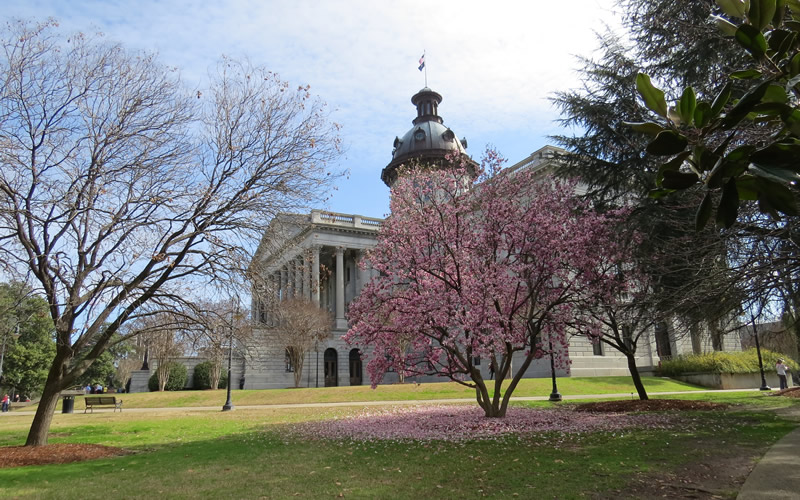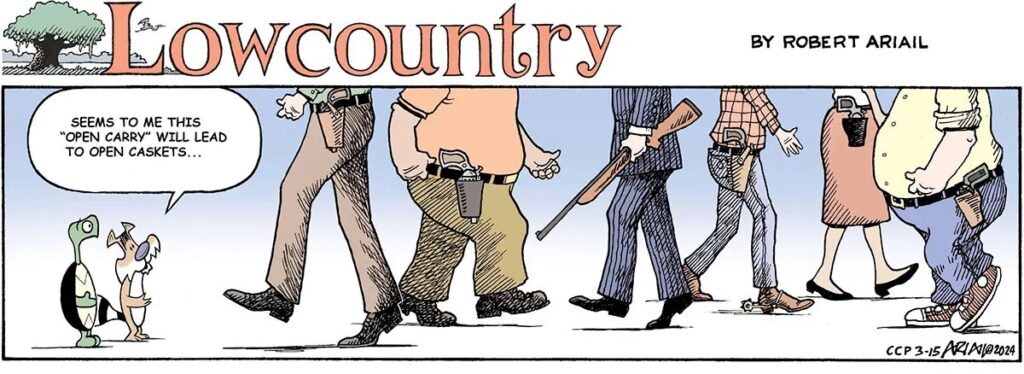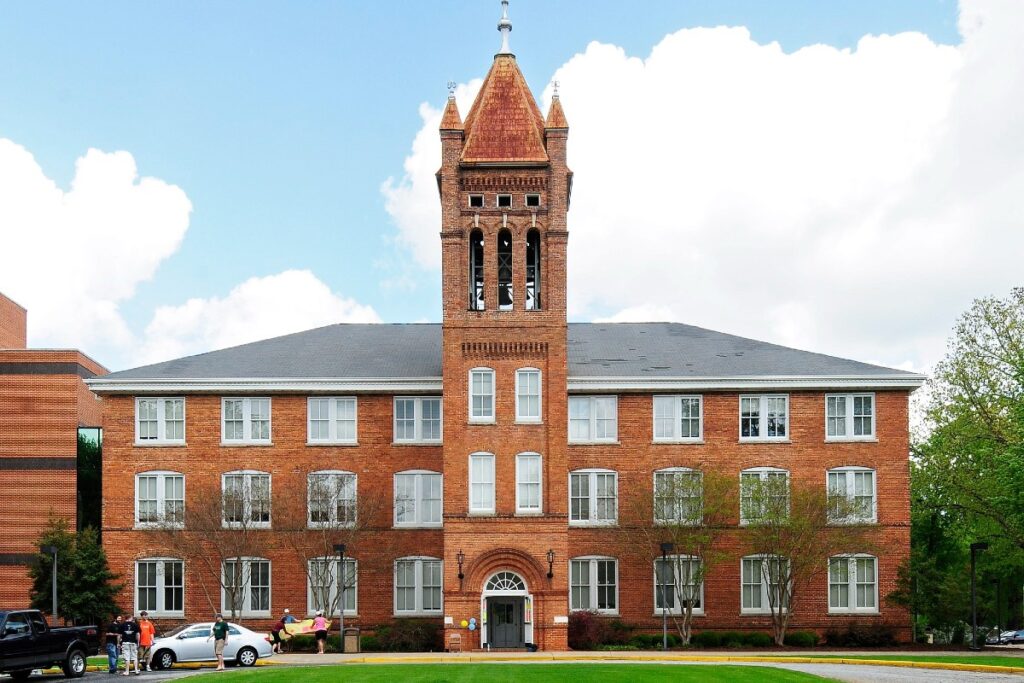STATEHOUSE REPORT | ISSUE 23.11 | March 15, 2024
BIG STORY: Teacher pay, tax cuts highlight ‘lean’ $13.2 billion House budget
MORE NEWS: McMaster rebukes Senate on restricting public health officials
LOWCOUNTRY, Ariail: Open carry > open caskets
COMMENTARY, Brack: Establishment brushes off self-anointed Freedom Caucus
SPOTLIGHT: The S.C. Education Association
MYSTERY PHOTO: Big brick building
FEEDBACK: On cosmetology reform and open carry gun law
Teacher pay, tax cuts highlight ‘lean’ $13.2 billion House budget

By Jack O’Toole | Pay raises for teachers and state workers along with tax cuts on homes and incomes are at the heart of a new $13.2 billion state budget that passed Wednesday in the S.C. House of Representatives. The key vote for the 2024-25 spending plan, however, came late Tuesday by a whopping 104-15 approval margin.
“Proud to have passed another House budget that focuses on reducing taxes, repairing infrastructure and retaining teachers and law enforcement!” House Speaker Murrell Smith, R-Sumter, wrote on X shortly after the vote.
Attention now moves to the Senate, where Sen. Tom Davis, a Beaufort Republican on the Senate Finance Committee member, said the Senate’s budget was still early in the process. But broadly speaking, he noted, the GOP-led House and Senate see eye-to-eye on spending priorities.
On the big tax cut in a ‘lean’ year
Beyond the crowd-pleasing pay raises and tax cuts, the House-crafted budget is what members are calling “lean,” with total spending down about $600 million from the current year budget.
This spending restraint was necessary, House budget-writers said, due to a steep decline in non-recurring revenues – primarily, the loss of billions of dollars in temporary federal Covid relief.
Also contributing to the revenue hole – a one-time $500 million dollar property tax cut, funded by surplus sales tax collections. Some, including Gov. Henry McMaster, argued the surplus should be used to fund critical state priorities such as bridge repair and replacement.
But House leaders noted the overage was already committed to property tax relief under Act 388, the 2007 law that raised the state’s sales tax in exchange for reductions in the property tax. In the end, the House opted to preserve the property tax cut and put a smaller amount – $200 million – toward bridge repairs.
Digging into the details
Floor debate on the proposed budget was largely pro forma, with members of the House Freedom Caucus – a breakaway faction of hard-right Republicans – raising now-familiar objections to spending on family planning, the arts and other “non core” government functions.
Freedom Caucus amendments were quickly voted down in a series of bipartisan votes, clearing the way for final passage Wednesday morning.
Among the highlights:
- $200 million for teacher pay raises, including funds to increase the minimum statewide starting salary to $47,000.
- $1,000 pay raises for all state employees making $66,000 or less, with 1.5% raises at higher levels. The state will also cover increases in the cost of employees’ health insurance plans.
- $500 million in one-time property tax relief, and $100 million in permanent income tax cuts.
- $200 million to improve aging bridges across the state.
- $60.7 million to freeze in-state tuition at state colleges and universities.
- $60 million to restructure the S.C. Department of Health and Environmental Control into freestanding agencies.
- $38.1 million for the state Office of Resilience to fight flooding and other natural disasters.
- $13 million for conservation grants to be awarded by the state Conservation Bank.
- $6.8 million for a new, privately-run juvenile detention center to alleviate overcrowding.
- $2.6 million to support pay raises for law enforcement officers, furthering a multi-year investment that State Law Enforcement Division Chief Mark Keel calls “transformative.”
- $1.5 million for a new Statewide Violent Crimes Prosecution Support Task Force to ease the backlog of cases in county solicitors’ offices.
‘This budget is a long way from over’
So now, the question facing Palmetto State teachers, state employees and taxpayers is this: Will those House commitments hold up when the Senate has its say on the budget next month? Or could some be pared back – perhaps even eliminated entirely?
S.C. Education Association President Sherry East told Charleston City Paper that teachers are “carefully watching” the budget process as it moves to the Senate.
“We’re very excited,” East said of the teacher pay hikes, which include a new statewide minimum salary of $47,000. “But you try not to put the cart before the horse, because this budget is a long way from over.”
Davis told Statehouse Report the Senate “shares the House’s commitment to increasing those teacher salaries, if not improving upon what the House did.”
“I think there’s a very strong sentiment over here in the Senate that the best thing we can do to improve student outcomes is to get quality teachers in the classroom,” he said. “And to get quality teachers in the classroom, you’re going to have to pay salaries commensurate with getting the best teachers.”
The Senate is scheduled to debate and pass its version of the budget in April. Members of the House and Senate will then have to negotiate a compromise bill that can pass both chambers – a process that should ideally be complete before the regular legislative session ends on May 9. But with members facing primary elections on June 11, many expect negotiations to extend into a special session later that month.
The state’s 2024-25 fiscal year begins July 1.
- Jack O’Toole reports on statewide issues for Statehouse Report and the Charleston City Paper. Have a comment? Send to: feedback@statehousereport.com.
McMaster rebukes Senate on health proposal

By Jack O’Toole | S.C. Gov. Henry McMaster is warning state senators that proposed legislation to radically restrict the authority of state officials during declared public health emergencies “could cripple South Carolina’s ability to respond promptly … and potentially place innocent lives at risk.”
Interestingly, McMaster pushed hard during the early months of the Covid pandemic to keep S.C. businesses open despite increased hospitalizations and concerns about the disease’s spread. The Palmetto State had the 10th highest death rate from Covid with more than 9,000 deaths, according to the Centers for Disease Control and Prevention.
Last year, McMaster emphasized his disdain for mask mandates and closures: “ As talks of mask mandates and closures kick up across the country, I can assure the people of South Carolina we will not have mask mandates, we will not close schools, and we will not lock down,” he said on X.
Nevertheless, McMaster’s rare public rebuke this week came on the eve of a March 14 Senate Medical Affairs subcommittee meeting to consider the bill, which supporters have dubbed The Medical Freedom Act.
Dr. Edward Simmer, director of the state Department of Health and Environmental Control, reiterated the governor’s message at the meeting.
“There are a number of issues where we believe this bill would actually cause harm to the people of South Carolina, and would in fact cause unnecessary death amongst the people of South Carolina,” Simmer told committee members.
In response, the committee agreed to remove language prohibiting the state health department from procuring and distributing vaccines that have not been in use for at least 10 years.
But still in the bill – and still of concern to the governor – are provisions limiting the authority of health officials to quarantine infected individuals, prohibiting public and private-sector employers from mandating vaccinations, and forbidding the state from treating natural disasters as public health emergencies.
Committee members voted to advance the legislation in a party-line vote, with Republicans voting yes and Democrats voting no.
In other recent headlines:
![]() City Paper named state’s best large weekly. The Charleston City Paper, parent of Statehouse Report, won 35 awards Friday in the S.C. Press Association’s annual contest of news excellence. The awards included 15 first-place prizes as well as being named the state’s top large weekly newspaper. The newspaper’s editorial board also received the coveted weekly newspaper award for assertive journalism for its coverage of redevelopment of Union Pier in downtown Charleston.
City Paper named state’s best large weekly. The Charleston City Paper, parent of Statehouse Report, won 35 awards Friday in the S.C. Press Association’s annual contest of news excellence. The awards included 15 first-place prizes as well as being named the state’s top large weekly newspaper. The newspaper’s editorial board also received the coveted weekly newspaper award for assertive journalism for its coverage of redevelopment of Union Pier in downtown Charleston.
How S.C. judges picked may change. The S.C. Senate gave key approval to a bill Thursday that would allow S.C. Gov. Henry McMaster to appoint members to a screening panel for judicial candidates — up to a maximum of four people. It also requires all qualified candidates — up to a maximum of six — be sent to the General Assembly for election.
S.C. leads the nation in preschool suspensions. South Carolina leads the nation in the number of preschool children, ages 2½ to 5 years old, who are suspended from school one or more times.
S.C. energy regulator quits over bill that would reduce oversight of utilities. Greenville attorney Tom Ervin, a member of the panel that regulates South Carolina utilities, has stepped down over a bill that he and other critics have blasted as a blank check for the power industry.
Bill takes aim at diversity initiatives at S.C. universities. A new bill proposed at the Statehouse on initiatives and programs aimed at promoting diversity, equity and inclusion, also known as DEI, at South Carolina’s public colleges and universities.
S.C., Southern states have low representation of women in Statehouses. South Carolina has among the lowest representation numbers of women in its Statehouse in the nation.
- Have a comment? Send to: feedback@statehousereport.com.
Open carry > open caskets

Award-winning cartoonist Robert Ariail generally has a biting or funny comment about the great state of South Carolina in his weekly cartoon. This week, he questions the future impact of the state’s new open carry gun law.
- Love the cartoon? Hate it? What do you think: feedback@statehousereport.com.
Establishment brushes off Freedom Caucus

By Andy Brack | There are always theatrics during the state’s annual budget process, but most of the time they seem limited to a minority party desperately trying to be heard so that the majority doesn’t completely get its way.
 It was like that 30 years ago when the Democrats controlled the House and has mostly been like that since Republicans took charge. But this year as lawmakers debated a $13.2 budget that is $600 million less than last year’s spending, a toothless beast that’s mostly been quiet rose to grab attention. A handful of House legislators in the uber-conservative House Freedom Caucus took on the Republican establishment, which flicked away two dozen hot-button social policy proposals with the help of minority Democrats.
It was like that 30 years ago when the Democrats controlled the House and has mostly been like that since Republicans took charge. But this year as lawmakers debated a $13.2 budget that is $600 million less than last year’s spending, a toothless beast that’s mostly been quiet rose to grab attention. A handful of House legislators in the uber-conservative House Freedom Caucus took on the Republican establishment, which flicked away two dozen hot-button social policy proposals with the help of minority Democrats.
Freedom Caucus zealots yammered their prepared talking points. They hemmed. They hawed. They spewed forth on everything from freezing higher education tuition to film incentives to how to pay deputies. Mostly, they whined the state shouldn’t do a lot of things it does because those functions were outside of the “core functions of government.”
For example, they didn’t want the budget to freeze tuition again at state colleges and universities to keep down costs for working families so their kids could afford to go to college. That, they said in their best libertarian fashion, was little more than a subsidized way for government to interfere in the marketplace.
Fortunately, most people in the legislature simply said, “Hold on. You don’t understand what you’re talking about.”
That’s because South Carolinians have a core belief that higher education is important in a state with a plantation history. Taxpayers believe in an American dream that if they work hard enough, then they’ll be able to send their kids to college with the expectation that their children will have a better life. The only way most can afford this path is if the tuition gets some help from the state. [Side note: State investment in education these days is in single digits of total cost, while it used to be in double digits three decades ago.]
So this Freedom Caucus attack on higher education is an attack on the economic model that’s the state’s backbone – that by increasing the education level of people in South Carolina, it will attract better jobs that will pay more and allow people to live better. That’s not a Democratic or Republican value. That’s an American value.
“Public education is a core function of government,” said Republican Rep. Micah Caskey, R-Lexington. “There is clearly a balancing of what has to happen. It exists on a spectrum on what level of funding the balance has to be shared between the individual and the public. And we do that now. We’ve existed with this tension for hundreds of years.”
More to the point, Caskey highlights how today’s high-tech jobs require more than just a high school education.
“It’s really hard to engineer automobiles and airplanes without engineers in your state,” he noted.
In the end, what this week’s two-day House budget debate – which was way less frenetic and tense than in previous years – showcased was that the state’s establishment leaders didn’t cotton to the talking points prepared in the best think tanks outside of South Carolina. They didn’t put much value in a group that one observer likened to a “a bunch of people who have proven themselves to be unserious actors and attention seekers.”
On a higher level, what’s really interesting is that the political tool of constant attention-seeking is the tactic constantly used by someone endorsed by most of the Republican caucus – former President Donald Trump.
What would be really fun – and illuminating – would be to find out what the same Republicans who brushed away the Freedom Caucus really think of Trump and his antics while they’re kowtowing to his political will because they’re worried about getting a primary challenge in the next election.
But there are some secrets that remain hidden, even in Columbia.
Andy Brack is editor and publisher of Statehouse Report and the Charleston City Paper. Have a comment? Send to: feedback@statehousereport.com.
The S.C. Education Association
 The public spiritedness of our underwriters allows us to bring Statehouse Report to you at no cost. This week’s spotlighted underwriter is The South Carolina Education Association(The SCEA), the professional association for educators in South Carolina. Educators from pre-K to 12th grade comprise The SCEA. The SCEA is the leading advocate for educational change in South Carolina. Educators in South Carolina look to The SCEA for assistance in every aspect of their professional life. From career planning as a student to retirement assessment as a career teacher, The SCEA offers assistance, guidance, and inspiration for educators.
The public spiritedness of our underwriters allows us to bring Statehouse Report to you at no cost. This week’s spotlighted underwriter is The South Carolina Education Association(The SCEA), the professional association for educators in South Carolina. Educators from pre-K to 12th grade comprise The SCEA. The SCEA is the leading advocate for educational change in South Carolina. Educators in South Carolina look to The SCEA for assistance in every aspect of their professional life. From career planning as a student to retirement assessment as a career teacher, The SCEA offers assistance, guidance, and inspiration for educators.
- Learn more: TheSCEA.org
Big brick building

This building has been here a while. What and were is it? Send your name, hometown and guess to: feedback@statehousereport.com.
 Last week’s photo, “More what than where,” showed a side view of the media area in front of the stage where former S.C. Gov. Nikki Haley suspended her presidential campaign. The room was at Blackbaud headquarters on Daniel Island.
Last week’s photo, “More what than where,” showed a side view of the media area in front of the stage where former S.C. Gov. Nikki Haley suspended her presidential campaign. The room was at Blackbaud headquarters on Daniel Island.
Congratulations to those who knew it was related to Haley, Daniel Island or both: Steve Willis of Lancaster; John Hart of Columbia; Bill Segars of Hartsville; Will Bradley of Las Vegas, Nevada; David Lupo of Mount Pleasant; Allan Peel of San Antonio, Texas; Jacie Godfrey of Florence; Pat Keadle of Wagener; and George Graf of Palmyra, Va.
- Send us a mystery picture. If you have a photo that you believe will stump readers, send it along (but make sure to tell us what it is because it may stump us too!) Send to: feedback@statehousereport.com and mark it as a photo submission. Thanks.
Cosmetology reform needed
To the editor:
![]() I respect regulations that are meant to keep the public safe, but there are many that have nothing to do with that. They are simply just oppressive. If so many other states allow mobile cosmetology services, for example, and they don’t see a problem with it, why does South Carolina? Why isn’t South Carolina encouraging the opportunity to earn a fair living and engage in entrepreneurialism?
I respect regulations that are meant to keep the public safe, but there are many that have nothing to do with that. They are simply just oppressive. If so many other states allow mobile cosmetology services, for example, and they don’t see a problem with it, why does South Carolina? Why isn’t South Carolina encouraging the opportunity to earn a fair living and engage in entrepreneurialism?
I am sure your wives, your daughters and sisters, had someone come to do their makeup and/or hair for their weddings. Let’s quit making them lawbreakers.
I’ve been in contact with S.C. Sen. Sandy Senn to help amend the shampoo regulation. No one is allowed to shampoo someone else’s hair unless you are a cosmetologist or barber. It’s SHAMPOO. It’s not chemicals, it’s not unsanitary, because it is a cleanser. What’s the worst that can happen?
I’ve inquired to the local barber school about just getting a barber assistant license, but they don’t even offer that! Six weeks of full time education, that includes manicures (why?) and then you can only work in a barber’s salon. And get a tuberculosis test, and go to boards, just because I want to offer a shampoo? If someone wants to do manicures, they will become a nail tech.
I’m actually an esthetics instructor and a massage therapist. I’m educated in sanitation, disinfection, skin care, and keeping the public safe, but I’m not allowed to shampoo or put products on the scalp. Which is still skin, which I am trained in.
– Jennifer Cuba, Charleston, S.C.
What are lawmakers thinking on guns?
To the editor:
I don’t get it. What are people thinking? Guns with no license required, etc.
All of your excellent points are scary. All we can do is hope people read and understand what you are writing.
– Kent Schulte, Mount Pleasant
Send us your thoughts
We encourage you to send in your thoughts about policy and politics impacting South Carolina. We’ve gotten some letters in the last few weeks – some positive, others nasty. We print non-defamatory comments, but unless you provide your contact information – name and hometown, plus a phone number used only by us for verification – we can’t publish your thoughts.
- Have a comment? Send your letters or comments to: feedback@statehousereport.com. Make sure to provide your contact details (name, hometown and phone number for verification. Letters are limited to 150 words.
- ORDER NOW: Copies are in Lowcountry-area bookstores now, but if you can’t swing by, you can order a copy online today.
- Now available as an e-book!
ABOUT STATEHOUSE REPORT
Statehouse Report, founded in 2001 as a weekly legislative forecast that informs readers about what is going to happen in South Carolina politics and policy, is provided to you at no charge every Friday.
- Editor and publisher: Andy Brack, 843.670.3996
Donate today
We’re proud to offer Statehouse Report for free. For more than a dozen years, we’ve been the go-to place for insightful independent policy and political news and views in the Palmetto State. And we love it as much as you do.
But now, we can use your help. If you’ve been thinking of contributing to Statehouse Report over the years, now would be a great time to contribute as we deal with the crisis. In advance, thank you.
Buy the book
Now you can get a copy of editor and publisher Andy Brack’s We Can Do Better, South Carolina! ($14.99) as a paperback or as a Kindle book ($7.99). . The book of essays offers incisive commentaries by editor and publisher Andy Brack on the American South, the common good, vexing problems for the Palmetto State and interesting South Carolina leaders.
More
- Mailing address: Send inquiries by mail to: P.O. Box 21942, Charleston, SC 29413
- Subscriptions are free: Click to subscribe.
- We hope you’ll keep receiving the great news and information from Statehouse Report, but if you need to unsubscribe, go to the bottom of the weekly email issue and follow the instructions.
- Read our sister publication: Charleston City Paper (every Friday in print; Every day online)
- © 2024, Statehouse Report, a publication of City Paper Publishing, LLC. All rights reserved.















 We Can Do Better, South Carolina!
We Can Do Better, South Carolina!